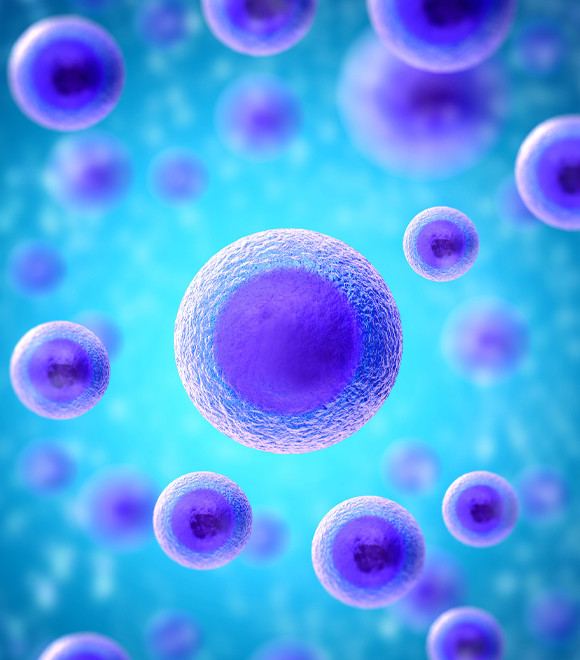

Why should you receive
hematopoietic stem cell transplantation in AMC?
Hematopoietic stem cell transplantation (HSCT) is used to treat malignant hematologic disorders (e.g. leukemia, lymphoma, multiple myeloma, etc.), solid malignant tumors, benign hematologic disorders (e.g. aplastic anemia, paroxysmal nocturnal hemoglobinuria, etc.), and other congenital immune and genetic disorders. It is largely distinguished by autologous and allogeneic hematopoietic stem cell transplantation. Autologous transplantation is transplantation of patient's hematopoietic stem cells, and allogeneic transplantation is transplantation of the stem cells and the family or other people.
Beginning from 1993 and up to 2016, AMC has performed 1,400 autologous hematopoietic stem cell transplantations and 2,300 allogeneic hematopoietic stem cell transplantations. Hematopoietic stem cell transplantation involves conditioning regimen or radiation therapy, injecting hematopoietic stem cells (HSC), post-transplant care, and complication treatment. It requires effective chemotherapy, superior technologies to collect and store HSC, precise infection control, and quality nursing care. AMC’s departments of hematology, oncology, and pediatric hematology & oncology strive to provide optimized hematopoietic stem cell transplantation and post-transplant care for each patient and are actively engaged in clinical research projects.
In particular, AMC is the most active center for haploidentical hematopoietic stem cell transplantation in Korea, and the effort has paid off with world-class achievements in haploidentical hematopoietic stem cell transplantation by minimizing complications with an advanced T-cell removal technique and lowering the relapse rate through a combination of immunotherapy with hematopoietic stem cell transplantation for malignant diseases.
Treatment options

Pretransplant chemotherapy (Required time 5-6 months)
Chemotherapy and immunosuppressive therapy are performed with different intensities before transplantation to regulate an immune response for the engraftment of hematopoietic stem cells and eliminate underlying diseases.
Hematopoietic stem cell transplantation (Required time 6-8 weeks)
Autologous hematopoietic stem cell transplantation
Chemotherapy and mobilization → collection of hematopoietic stem cells (HSC) → treatment and storage of HSC → high-intensity chemotherapy → thawing of HSC → injection of HSC
Allogenic hematopoietic stem cell transplantation
Selection of a donor (siblings) → chemotherapy for a recipient → donor mobilization → collection of HSC → conditioning chemotherapy/radiotherapy → injection of HSC

Complication care (from immediately after transplantation to 1 year)
Complications may occur such as graft versus host reaction, infection, engraftment failure, fatigue, loss of appetite, premature menopause, and infertility, even after hematopoietic stem cell transplantation. Therefore, it is important to not only monitor patients carefully and quickly respond to complications, but also to closely cooperate with the departments of obstetrics and gynecology, endocrinology and metabolism, ophthalmology, and rehabilitation medicine to improve patients’ quality of life.
Treatment effects
- Cancer treatment : Anticancer drugs injected before transplantation is effective in eliminating cancerous tumors and preventing recurrence.
- Immune system treatment : HSC of a donor injected reconstructs the immune system of a recipient, generating therapeutic effects.
Treatment results
- 14% of 2,300 transplantations performed in about 40 hospitals nationwide in 2016 were conducted at AMC.
AMC’s treatment performance
- Jan. 1993: Autologous hematopoietic stem cell transplantation implement
- Dec. 1993: Allogenic hematopoietic stem cell transplantation implement
- Oct. 1997: Hematopoietic stem cell transplantation from stranger donors implement
- May 2007: NK cell division and culture implement
- Jan. 2008: Haploidentical hematopoietic stem cell transplantation using in vitro T-cell removal implement
- May 2010: Achieved 500th autologous hematopoietic stem cell transplantation
- Mar. 2011: Achieved 1,000th allogeneic hematopoietic stem cell transplantation
- Aug. 2012: Achieved 300th pediatric allogeneic hematopoietic stem cell transplantation
- Oct. 2015: Achieved 100th pediatric haploidentical hematopoietic stem cell transplantation
- Dec. 2016: Achieved 500th pediatric allogeneic hematopoietic stem cell transplantation
